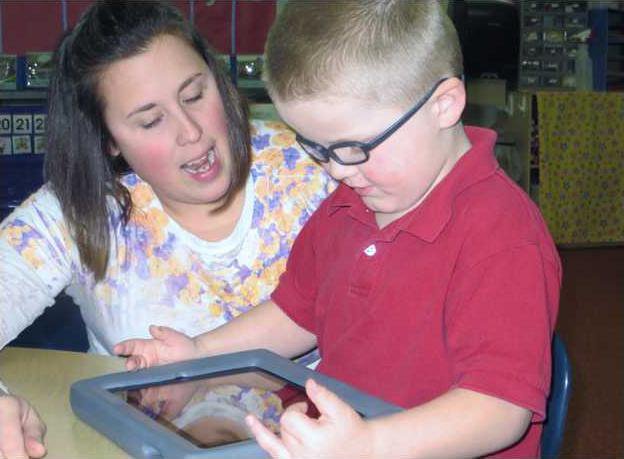Editor’s note: This is the first of two stories about how iPads are helping teachers zero in on behavioral issues at Helping Hands Preschool. The Sunflower Diversified Services Foundation recently donated two iPads to the school and one to its own Early Education Center. The second article will explain Sunflower’s point of view.
During the time before the iPad was introduced into Kari Carper’s class at Helping Hands Preschool, young Brendon Ray wasn’t exactly taking to the idea of toilet training. Brendon has been diagnosed with autism.
“It would take him 35 to 45 minutes to perform this task, which he is quite capable of doing,” said Carper, early childhood special education teacher. “He would play around, flush the toilet over and over again, while striking out at others.
“Then we introduced the iPad,” Carper recalled, smiling at the memory. “He loved it. When it was time to go to the bathroom, we used the iPad as a motivator, which is one of its big advantages.”
On the first day, Brandon engaged in his not-so-nice behaviors for 15 minutes and the next day it was down to seven minutes.
“On the third day,” Carper noted, “Brendon completed his toilet routine independently with no other prompts.”
Another child, who will be referred to as John, also has been diagnosed with autism.
“It was very difficult to get anything out of this child,” Carper said. “I know that he is very smart and has a lot of skills. I had him in small groups with his peers, hoping for success that didn’t come.”
Then came the iPad. A small group gathered for exercises in animal memory and puzzles, but John was unsuccessful. Carper then found a memory app about animals that also made the animal sound when the match was made.
“I had the child go last in the rotation so that he could observe,” Carper explained. “When it was his turn, he knew exactly what to do with no prompting. He didn’t get a match until his fourth turn, but was engaged during the entire 10-minute game.”
John had a similar experience catching on to the puzzle exercise.
The Sunflower Diversified Services Foundation recently donated two iPads to Helping Hands. Prior to this, Carper had used an iPod Touch, which was helpful. Then Helping Hands Coordinator Michelle Cape, who was aware of the iPod Touch successes, gave Carper an iPad. This turned out to be an even more effective tool.
Some Helping Hands students have developmental disabilities, and others are 4 year olds in the state’s at-risk program. Those who are developing typically round out the classrooms for 3 to 5 year olds. Sunflower Diversified serves infants, toddlers and adults with developmental disabilities and delays.
Nichole Jeffrey, Helping Hands speech-language pathologist, said the Sunflower donation is a godsend.
“These iPads will benefit so many kids – all the kids at Helping Hands,” Jeffrey said. “It is awesome. There are so many regular apps, and others can be customized to fit particular needs.”
The fringe benefit, Jeffrey added, is that the technology allows teachers to spend more time with the little ones, and less time with paperwork.
“The iPad tracks our data for us, and we don’t have to spend time writing it all down throughout the day,” Jeffrey commented. “We can engage the children in more activities, and it is so much easier to communicate with parents and doctors. We can illustrate a child’s progress with the touch of the screen.”
While Carper and Jeffrey know the benefits of technology, they also voice a cautionary tale.
“Teachers must be careful to not rely completely on the iPad,” Carper said. “It is a wonderful place to start, but when an exercise is mastered, we have to ensure children retain information.”
For example, she explained, a child may learn colors with the help of an iPad but may not generalize that information in another setting.
“The iPad helps us get a good base of information, but we must continue these lessons,” Carper said. “We are careful to determine that they can demonstrate their knowledge in the classroom and at home.”
High-tech tools: iPads help teachers zero in on behavioral issues





